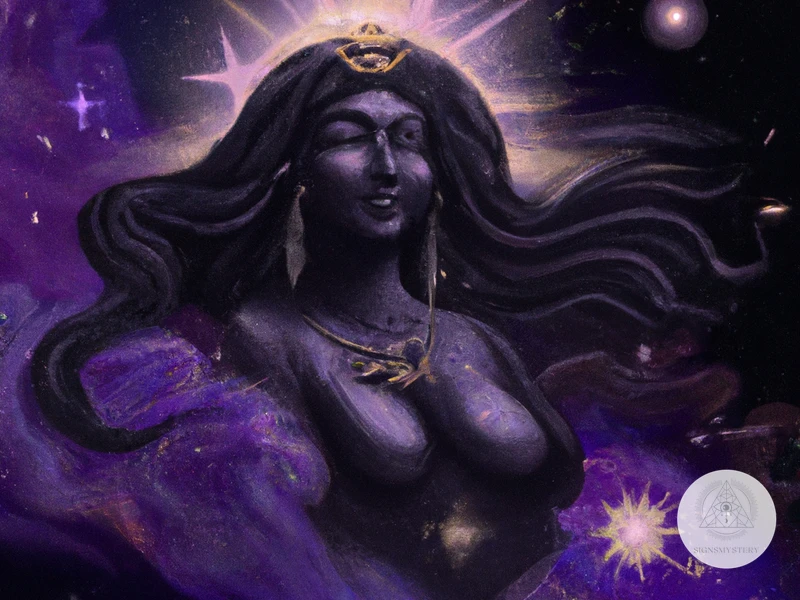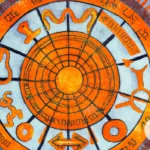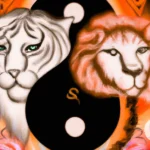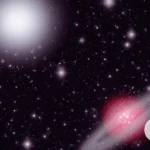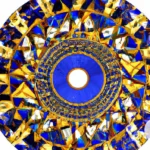Astrology and mythology, two captivating fields that have intrigued humans for centuries, share a profound connection that goes beyond mere coincidence. The Role of Mythology in Astrology explores this intricate relationship, delving into the ancient origins of astrology and its undeniable ties to mythological figures and symbolism. From Greek and Roman mythology to Norse and Egyptian lore, we uncover the prevalent mythological influences within astrology. This article explores how mythology is interpreted in astrology, from understanding zodiac sign characteristics to making connections with astrological birth charts. Additionally, we delve into the influence of mythology on horoscopes, uncovering the presence of mythological aspects in horoscope forecasting and the incorporation of captivating mythological tales in horoscope interpretations. Join us on this enthralling journey as we navigate the fascinating world where mythology and astrology intertwine.
The Connection between Mythology and Astrology
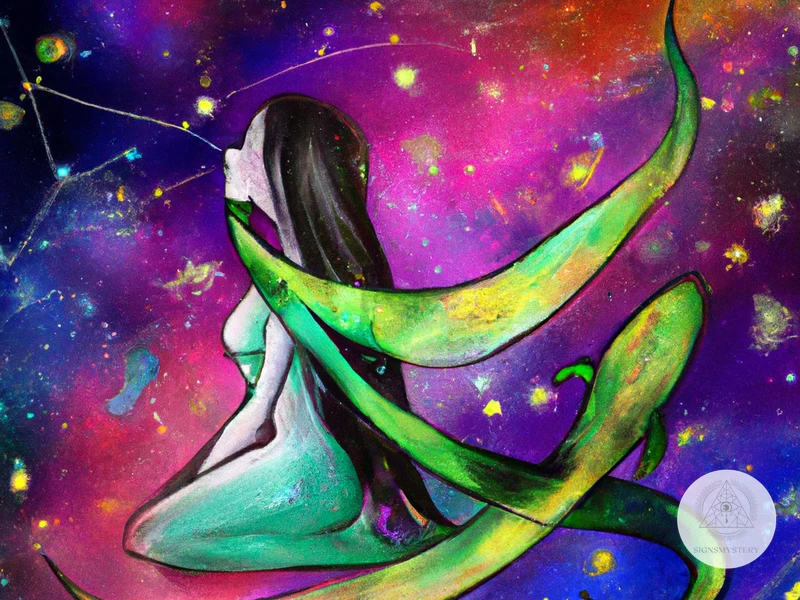
Astrology and mythology have a deep-rooted and interwoven connection that has endured throughout history. The ancient origins of astrology can be traced back to civilizations such as the Mesopotamians, Egyptians, and Greeks, who believed that the celestial bodies held great influence over human existence. These early astrologers drew upon the rich tapestry of mythological figures to interpret the movements and positions of the planets and constellations. They believed that the gods and goddesses represented different archetypes and embodied specific qualities, which were reflected in the zodiac signs.
In astrology, each zodiac sign is associated with a mythological figure that encapsulates its characteristics and traits. For example, Aries is linked to the Greek god of war, Mars, representing strength, courage, and assertiveness. Similarly, Taurus is associated with the Greek myth of Zeus disguising himself as a bull, symbolizing stability and sensuality. Each zodiac sign draws upon the mythological stories and legends to depict the inherent qualities that individuals born under these signs possess.
Astrology relies heavily on archetypes and symbolism, which have their roots in mythology. Archetypes are universal patterns of behavior and personality traits that are deeply embedded in the collective unconscious. These archetypes are mirrored in the astrological system, where each sign represents a unique set of characteristics and behaviors. Whether it is the nurturing and compassionate nature of Cancer, associated with the myth of the nurturing goddess Demeter, or the quick-witted and adaptable nature of Gemini, linked to the mythical twins Castor and Pollux, mythology provides a rich framework for deciphering the complexities of astrology.
The connection between mythology and astrology goes beyond mere symbolism. It is through mythology that astrology gains depth and narrative, allowing individuals to relate to their own personal journeys through the lens of these ancient tales. Mythology provides a framework for understanding the cosmic forces at play and allows for a deeper exploration of one’s own psyche and purpose. By exploring the mythology behind astrology, we can tap into the archetypal energies that resonate within us and gain a greater understanding of ourselves and the world around us.
Understanding the connection between mythology and astrology is crucial for anyone looking to explore the depths of this ancient practice. By delving into the rich tapestry of myths and legends, we can unlock a deeper understanding of ourselves, our relationships, and our place in the cosmos. Whether you are seeking career guidance, navigating the challenges of a blended family, or simply looking to gain insights into your own sun sign, astrology intertwined with mythology offers a profound and enlightening journey of self-discovery and personal growth. (Link: Importance of Sun Sign in Astrology Chart)
1. Ancient Origins of Astrology
The ancient origins of astrology can be traced back to civilizations such as the Mesopotamians, Egyptians, and Greeks. These early cultures observed the movements of the celestial bodies and recognized their significant influence on earthly events and human behavior. In Mesopotamia, astrology originated as a means to predict and interpret natural disasters, agricultural cycles, and the fate of nations.
The Babylonians, one of the earliest civilizations to develop astrological systems, believed that the positions of the planets and stars held cosmic messages and provided insights into human destiny. They developed the zodiac, dividing the sky into twelve equal sections or constellations, each representing a different phase of the year. Through meticulous observations and record-keeping, they established the foundation for modern astrology.
The Egyptians, too, were deeply invested in astrology, associating celestial bodies with their pantheon of gods and goddesses. They believed that the movements of the planets were indicative of the gods’ will and used astrology to guide their actions and decisions. The Egyptians observed the correlation between the annual flooding of the Nile River and the position of the stars, further cementing their belief in the connection between the celestial and earthly realms.
The Greeks, building upon the knowledge of their predecessors, added their own insights and mythological interpretations to astrology. They associated the planets with their gods and saw astrology as a way to understand both the external world and the internal psyche. Pioneers such as Ptolemy and Hippocrates contributed to the development of astrological techniques and systems that are still used today.
While the ancient origins of astrology may differ across cultures, the underlying belief in the symbiotic relationship between celestial bodies and human existence remains consistent. These early civilizations laid the groundwork for the astrological principles and practices we engage with in modern times. Whether exploring astrology for personal growth, seeking career guidance (Link: Explore Astrology Career Guidance), or navigating the dynamics of a blended family (Link: Astrology and Blended Families), understanding the ancient origins of astrology provides a fascinating glimpse into the enduring fascination and relevance of this ancient practice.
2. Mythological Figures and the Zodiac Signs
The zodiac signs in astrology are closely associated with mythological figures, and each sign draws inspiration from the stories and attributes of these figures. Let’s explore some of the key mythological figures and their corresponding zodiac signs:
1. Aries (March 21 – April 19): Aries is represented by the Ram and associated with the Greek god of war, Mars. Just like Mars, Aries is known for its fierce and courageous nature, always ready to take on challenges.
2. Taurus (April 20 – May 20): Taurus is symbolized by the Bull and rooted in the myth of Zeus, who disguised himself as a bull to win the affection of Europa. Taurus embodies the stability, sensuality, and determination represented by the bull.
3. Gemini (May 21 – June 20): Gemini is represented by the Twins, Castor and Pollux, from Greek mythology. These twins represent the dual nature of Gemini, known for their versatility, curiosity, and quick-wittedness.
4. Cancer (June 21 – July 22): Cancer is symbolized by the Crab, associated with the myth of the nurturing Greek goddess Demeter. As with the crab, Cancer individuals are known for their caring, empathetic, and protective nature.
5. Leo (July 23 – August 22): Leo is represented by the Lion, drawing inspiration from the Nemean Lion of Greek mythology. Like the mighty lion, Leos are confident, charismatic, and natural-born leaders.
6. Virgo (August 23 – September 22): Virgo is symbolized by the Virgin, representing the Greek goddess of harvest, Demeter’s daughter, Persephone. Virgos possess the qualities of diligence, practicality, and a strong attention to detail.
7. Libra (September 23 – October 22): Libra is associated with the Scales of Justice and represents the Greek goddess of justice, Themis. Just as the scales balance and seek fairness, Libras are known for their diplomacy, harmony, and desire for justice.
8. Scorpio (October 23 – November 21): Scorpio is symbolized by the Scorpion and associated with the myth of Scorpius, the giant scorpion that killed the great hunter Orion in Greek mythology. Like the scorpion, Scorpios are passionate, intense, and have a deep desire for transformation.
9. Sagittarius (November 22 – December 21): Sagittarius is represented by the Archer and tied to the Greek centaur, Chiron, known for his wisdom and mentorship. Sagittarians are adventurous, optimistic, and seek knowledge and truth.
10. Capricorn (December 22 – January 19): Capricorn is symbolized by the Goat and linked to the myth of Amalthea, the goat who nourished Zeus in Greek mythology. Capricorns are known for their ambition, perseverance, and disciplined nature.
11. Aquarius (January 20 – February 18): Aquarius is associated with the Water Bearer and inspired by Ganymede, the cupbearer of the gods in Greek mythology. Aquarians are known for their eccentricity, humanitarianism, and innovative thinking.
12. Pisces (February 19 – March 20): Pisces is symbolized by the Fish and associated with the myth of Aphrodite and Eros, who transformed into fish to escape the giant Typhon in Greek mythology. Pisceans are known for their empathy, creativity, and deep emotional connection.
These mythological connections add depth and symbolism to the interpretation of each zodiac sign, allowing individuals to delve into the archetypal energy that influences their personality and life path. Understanding the mythological figures behind the zodiac signs provides a rich framework for self-reflection and a deeper appreciation for the intricate connection between mythology and astrology.
3. The Archetypes and Symbolism
3. The Archetypes and Symbolism
In astrology, archetypes play a significant role in understanding the complexities of human nature and behavior. Archetypes represent universal patterns and are deeply ingrained in the collective unconscious. These archetypes are reflected in the zodiac signs, each sign embodying distinct qualities and characteristics.
Let’s explore some of the archetypes and symbolism associated with the zodiac signs:
1. Aries: The Warrior – Aries, symbolized by the ram, embodies the archetype of the warrior. This sign represents assertiveness, courage, and leadership. The Aries individual is driven to conquer challenges and blaze their own trail.
2. Taurus: The Earth Mother – Taurus, represented by the bull, represents the archetype of the earth mother. This sign is associated with stability, sensuality, and groundedness. Taurus individuals are nurturing, dependable, and value security.
3. Gemini: The Trickster – Gemini, symbolized by the twins, embodies the archetype of the trickster. This sign represents curiosity, adaptability, and communication. Geminis are known for their quick wit, versatility, and ability to see different perspectives.
4. Cancer: The Caregiver – Cancer, represented by the crab, embodies the archetype of the caregiver. This sign is associated with nurturing, empathy, and emotional sensitivity. Cancer individuals are deeply caring, protective, and attuned to the needs of others.
5. Leo: The King/Queen – Leo, symbolized by the lion, represents the archetype of the king or queen. This sign embodies leadership, confidence, and creativity. Leos have a magnetic presence and thrive in the spotlight.
6. Virgo: The Healer – Virgo, symbolized by the maiden, embodies the archetype of the healer. This sign represents practicality, organization, and attention to detail. Virgos are known for their analytical skills, problem-solving abilities, and desire for perfection.
7. Libra: The Diplomat – Libra, represented by the scales, represents the archetype of the diplomat. This sign embodies balance, harmony, and justice. Libras are skilled mediators, value fairness, and strive for harmonious relationships.
8. Scorpio: The Transformer – Scorpio, symbolized by the scorpion, embodies the archetype of the transformer. This sign represents intensity, passion, and deep emotional connections. Scorpios are known for their transformative powers, intensity, and ability to embrace the shadow.
9. Sagittarius: The Explorer – Sagittarius, represented by the archer, embodies the archetype of the explorer. This sign represents adventure, freedom, and philosophical pursuits. Sagittarians have a thirst for knowledge, love to explore new horizons, and seek higher truths.
10. Capricorn: The Wise Elder – Capricorn, symbolized by the sea-goat, represents the archetype of the wise elder. This sign embodies discipline, ambition, and responsibility. Capricorns are known for their wisdom, perseverance, and practicality.
11. Aquarius: The Visionary – Aquarius, represented by the water-bearer, embodies the archetype of the visionary. This sign represents innovation, humanitarianism, and independent thinking. Aquarians are forward-thinking, idealistic, and motivated to make a difference.
12. Pisces: The Mystic – Pisces, symbolized by the fish, embodies the archetype of the mystic. This sign represents intuition, empathy, and spiritual connection. Pisceans are highly sensitive, imaginative, and have a deep understanding of the human experience.
These archetypes and symbols provide a framework for understanding the diverse range of qualities and characteristics associated with each zodiac sign. By exploring and embracing these archetypal energies, we can gain a deeper understanding of ourselves and the world around us. Astrology, rooted in mythology, offers a rich tapestry of symbolism and archetypes that provide profound insights into our individual journeys. (Link: Astrology and Blended Families)
Popular Mythological Influences in Astrology
Popular Mythological Influences in Astrology span across various cultures and mythologies, enriching the astrological framework with their unique tales and symbolism. Let’s explore some of these fascinating mythological influences:
1. Greek Mythology:
Greek mythology holds a significant place in astrology, with many zodiac signs deriving their names and characteristics from Greek gods and goddesses. For instance, Aries, the first sign of the zodiac, is associated with the courageous and fiery god Ares. The goddess Aphrodite lends her charm and love to the sign of Libra, while the mighty Zeus represents the ambitious and authoritative qualities of Leo. These mythological figures bring depth and meaning to the astrological understanding of these signs.
2. Roman Mythology:
Roman mythology, closely intertwined with Greek mythology, also has a strong presence in astrology. The planets in our solar system are named after Roman gods and goddesses, and their influence on our lives is believed to align with their respective mythological personas. For example, Mercury, the planet of communication and intellect, derives its name from the Roman god of the same name. Similarly, the goddess Venus symbolizes love and beauty, aligning with the characteristics associated with the planet Venus in astrology.
3. Norse Mythology:
Norse mythology, originating from the Scandinavian region, brings its own unique set of influences to astrology. The zodiac sign of Gemini finds its connection in Norse mythology through the mythological figure of Loki, the trickster god known for his duality and quicksilver nature. The powerful and wise god Odin embodies the qualities associated with the zodiac sign of Sagittarius. These mythological influences provide a different perspective and narrative to the astrological understanding of these signs.
4. Egyptian Mythology:
Egyptian mythology, with its rich symbolism and mystical tales, also finds its place in astrology. The zodiac sign of Cancer is associated with the Egyptian goddess Isis, representing motherhood and nurturing. The regal and authoritative qualities of the zodiac sign Leo resonate with the symbolism of the Egyptian god Ra, the Sun god. These mythological influences in astrology add a unique cultural perspective and depth to the interpretation of these signs.
The infusion of these popular mythological influences into astrology brings a rich tapestry of stories, symbolism, and archetypal energies to the practice. Whether it’s the vibrant tales of Greek mythology, the mystical allure of Egyptian mythology, or the ancient wisdom of Norse mythology, these influences enhance our understanding and interpretation of astrology, offering a deeper connection to the cosmic forces at play. By tapping into these mythological archetypes, we can uncover additional layers of meaning and insight, making our astrological journey even more profound and enlightening.
1. Greek Mythology
Greek mythology has had a significant influence on astrology, with many zodiac signs and celestial bodies being associated with Greek mythological figures. Let’s explore some of the prominent connections:
1. Aries (March 21 – April 19): In Greek mythology, Aries is linked to the god of war, Mars. Aries embodies the qualities of courage, strength, and assertiveness, just like the mighty Mars.
2. Taurus (April 20 – May 20): Taurus finds its roots in the myth of the Zeus, who transformed himself into a bull to carry away the beautiful Europa. Taurus represents stability, sensuality, and earthy pleasures.
3. Gemini (May 21 – June 20): The twins, Castor and Pollux, are closely associated with Gemini. They were known for their quick wit and adaptability, traits that are reflected in the dual nature of the Gemini sign.
4. Cancer (June 21 – July 22): Cancer is associated with the nurturing and protective goddess Demeter, who epitomizes motherly love and care. Those born under Cancer are known for their emotional depth and instinctual nurturing qualities.
5. Leo (July 23 – August 22): In Greek mythology, Leo is linked to the Nemean Lion, a fierce and powerful creature. Leo individuals are known for their confidence, leadership qualities, and the ability to shine brightly, just like the majestic lion.
6. Virgo (August 23 – September 22): Virgo represents the myth of the goddess Astraea, the goddess of innocence and purity. Virgos are known for their meticulous attention to detail, practicality, and analytical thinking.
7. Libra (September 23 – October 22): Libra finds its association with the goddess Aphrodite, the goddess of love and beauty. Libras are known for their harmonious nature, diplomatic skills, and their desire for balance and fairness.
8. Scorpio (October 23 – November 21): Scorpio is associated with the myth of the scorpion that stings Orion. Scorpios embody intensity, passion, transformation, and have the ability to delve into the depths of their emotions.
9. Sagittarius (November 22 – December 21): Sagittarius finds its connection with the centaur Chiron, a wise and adventurous being. Sagittarians are known for their thirst for knowledge, love for exploration, and their philosophical nature.
10. Capricorn (December 22 – January 19): Capricorn is associated with the god Pan, who was known for his connection with nature and his determination. Capricorns are known for their discipline, ambition, and strong work ethic.
11. Aquarius (January 20 – February 18): In Greek mythology, Aquarius is linked to the story of Ganymede, a beautiful youth who became the cupbearer of the gods. Aquarians are known for their unique perspectives, humanitarian ideals, and their ability to think outside the box.
12. Pisces (February 19 – March 20): Pisces finds its connection with the myth of Aphrodite and Eros, who transformed themselves into fishes to escape a monster. Pisceans are known for their compassion, empathy, and their deep connection to the emotional and spiritual realms.
Greek mythology continues to captivate and inspire individuals who delve into the realm of astrology. It adds a layer of depth and symbolism to the zodiac signs, allowing us to better understand ourselves and the world around us through these ancient stories. (Link: Explore Astrology for Career Guidance)
2. Roman Mythology
Roman mythology, with its rich pantheon of gods and captivating tales, holds a significant influence on astrology. Many of the zodiac signs draw inspiration from Roman myths, infusing them with fascinating symbolism and meaning.
One prominent figure in Roman mythology is Jupiter, the king of the gods and ruler of the skies. This mighty deity is associated with the zodiac sign Sagittarius, known for their adventurous spirit, optimism, and philosophical nature. Sagittarians, like Jupiter, are often seen as visionary and expansive, seeking knowledge and wisdom in their pursuit of truth.
Another Roman god, Mars, is closely linked to the zodiac sign Aries. Mars, the god of war, represents courage, assertiveness, and physical strength. Arians are known for their boldness, ambition, and passion, echoing the martial energies of Mars. This connection emphasizes the fiery and energetic nature of Aries individuals.
Venus, the goddess of love and beauty, is associated with the zodiac sign Taurus. Taureans are known for their sensuality, appreciation of art, and steadfastness. Venus embodies these qualities, representing grace, affection, and a deep appreciation for the pleasures of life. The connection between Taurus and Venus highlights the significance of romance, harmony, and aesthetics in the lives of those born under this sign.
The mighty ruler of the underworld, Pluto, lends its influence to the zodiac sign Scorpio. Known for its intensity, depth, and transformative nature, Scorpio shares Pluto’s association with the mysterious and the hidden. Just as Pluto governs the realm of the unseen, Scorpios have a penchant for delving into the depths of the human psyche, seeking truth and profound transformation.
Roman mythology weaves a rich tapestry of gods, goddesses, and legends that influencethe astrological landscape. The connection between these myths and astrology allows for a deeper understanding of the qualities, characteristics, and energies associated with each zodiac sign. Exploring the mythology behind astrology not only provides a wellspring of creative inspiration but also offers insights into our own personal strengths, challenges, and aspirations. By delving into the stories and symbolism of Roman mythology, we unlock a deeper understanding of ourselves and the cosmic forces that shape our lives.
3. Norse Mythology
Norse mythology, with its rich and captivating tales of gods and heroes, has left an indelible mark on astrology. Norse mythology, also known as Viking mythology, is filled with powerful gods and goddesses, epic battles, and profound symbolism that aligns perfectly with the astrological archetypes. One prominent figure in Norse mythology is Odin, the Allfather and ruler of Asgard. Odin’s association with wisdom, knowledge, and shamanism resonates strongly with the zodiac sign of Scorpio. Just as Odin sought wisdom and divine insight, Scorpios are known for their deep intuition and transformative abilities. Thor, the mighty god of thunder known for his strength and protection, mirrors the characteristics of the zodiac sign Leo, which is ambitious, courageous, and commands attention. These connections between Norse mythology and astrology allow for a deeper understanding of the zodiac signs and their inherent qualities. Whether it’s exploring the cosmic connections between Loki’s mischievous nature and the trickster aspect of Gemini or unraveling the symbolism and wisdom behind Freya, the goddess of love and fertility, and the harmonious and affectionate nature of Libra, Norse mythology adds a layer of depth and intrigue to astrological interpretations. By drawing upon Norse mythology, astrologers and enthusiasts can explore new dimensions and unravel the mysteries of the cosmos.
4. Egyptian Mythology
Egyptian mythology plays a significant role in astrology, with several connections between the ancient Egyptian pantheon and astrology’s zodiac signs. In Egyptian mythology, the gods and goddesses were associated with various celestial bodies and natural phenomena, making them ideal counterparts for astrological symbolism.
One prominent figure in Egyptian mythology is Ra, the sun god. Ra is often depicted with a sun disk on his head, symbolizing the power and energy of the sun. In astrology, the sun represents an individual’s core essence and vitality, reflecting their true identity and purpose. People born under the sun sign of Leo are believed to embody characteristics associated with Ra, such as strength, leadership, and creativity.
Another crucial deity in Egyptian mythology is Thoth, the god of wisdom, writing, and knowledge. Thoth is often depicted with the head of an ibis or as a baboon. In astrology, the sign of Gemini is associated with Thoth due to their similar traits of intelligence, adaptability, and communication skills. Gemini individuals are believed to possess the ability to analyze information quickly and convey it effectively to others.
Isis, the goddess of magic and fertility, is also prominent in Egyptian mythology. She is often depicted with wings and a headdress adorned with a solar disk and cow horns. In astrology, the sign of Cancer shares connections with Isis due to their nurturing and protective nature. Cancer individuals are believed to be deeply caring and emotionally intuitive, much like Isis, who is known for her ability to heal and provide comfort.
Egyptian mythological figures don’t only align with specific zodiac signs but also contribute to the overall symbolic language of astrology. The ancient Egyptian belief in the afterlife and the journey of the soul is reminiscent of astrology’s focus on the cycle of life, death, and rebirth. The mythology surrounding Osiris, the god of the dead, reflects the transformative qualities of Scorpios in astrology. People born under the sign of Scorpio are believed to possess intense emotional depth and the ability to undergo profound transformations, much like Osiris’ journey through death and resurrection.
By drawing upon the rich mythology of ancient Egypt, astrology gains a deeper layer of symbolism and meaning. The inclusion of Egyptian mythological influences allows for a broader understanding of the human experience and the cosmic forces at play. Exploring the connections between Egyptian mythology and astrology allows individuals to delve into the archetypal energies that underpin their own astrological makeup and provides a unique lens through which to understand their own personal journeys. Understanding the significance of Egyptian mythology within astrology adds depth and nuance to the practice, allowing for a more comprehensive and insightful interpretation of the zodiac signs and their associated traits.
Interpreting Mythology in Astrology
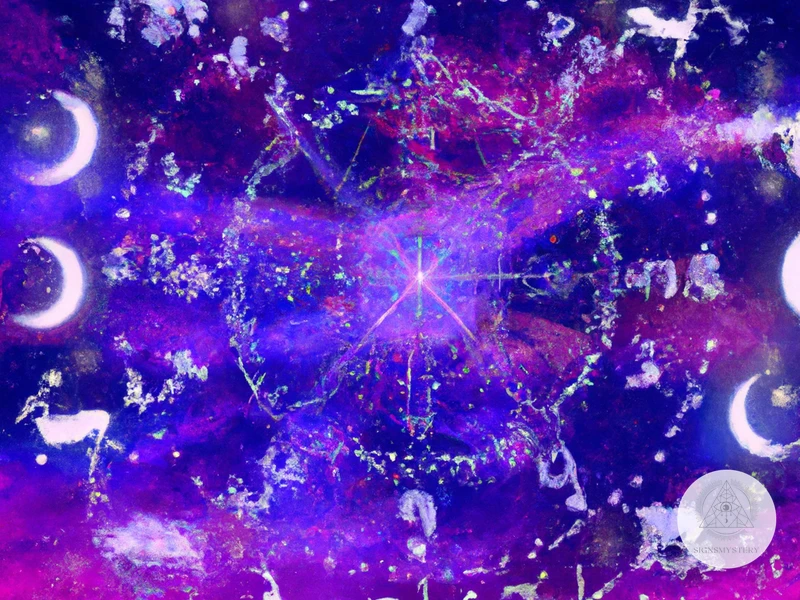
Interpreting mythology in astrology involves unraveling the symbolic connections between mythological figures and astrological concepts. By understanding the characteristics and stories associated with mythological figures, we can gain valuable insights into the zodiac signs and their corresponding traits.
1. Understanding Zodiac Sign Characteristics:
Each zodiac sign has unique characteristics derived from the mythological figures they are linked to. For instance, Scorpio, associated with the powerful and transformative phoenix, represents intensity, passion, and rebirth. By exploring the mythological origins of each zodiac sign, astrologers can provide a deeper understanding of an individual’s personality, strengths, weaknesses, and potential growth areas.
2. Astrological Birth Charts and Mythological Connections:
Astrological birth charts, also known as natal charts, are intricate maps that depict the positions of celestial bodies at the time of an individual’s birth. By interpreting these charts alongside mythological stories, astrologers can draw parallels between the planetary placements and the characteristics of the corresponding gods and goddesses. This connection allows for a more nuanced understanding of an individual’s astrological makeup and life’s potential themes.
3. Mythological Astrology Readings:
Astrologers often incorporate mythology into their readings to provide a narrative context for understanding an individual’s astrological profile. By weaving mythological stories into astrology readings, astrologers can bring depth and meaning to the interpretation of planetary influences. These readings offer valuable insights into one’s personal journey, strengths, challenges, and areas of growth, ultimately guiding individuals towards self-awareness and personal transformation.
Interpreting mythology in astrology can be done through various methods, such as creating tables or lists that pair each zodiac sign with its corresponding mythological figure and the associated traits. This visual representation can help astrologers and enthusiasts alike in identifying and understanding the mythological connections within astrology. By exploring the rich tapestry of mythology, astrology becomes a powerful tool for self-discovery, helping individuals navigate their lives with a deeper understanding of their own unique mythic journey.
1. Understanding Zodiac Sign Characteristics
Understanding the characteristics of each zodiac sign is a fundamental aspect of astrology, as it allows individuals to gain insights into their own personality traits and behaviors. Each sign has its unique set of qualities that are influenced by the mythological figures they are associated with.
Aries, the first zodiac sign, is symbolized by the Ram, reflecting its courageous and assertive nature. Those born under this sign are often characterized by their leadership skills, determination, and passion. Aries embodies the fiery and impulsive energy of the Greek god of war, Mars. They are natural-born warriors who are not afraid to take risks and pursue their goals with unwavering dedication.
Taurus, represented by the Bull, is associated with the Earth element, symbolizing stability and practicality. Those born under this sign are known for their grounded nature, loyalty, and strong work ethic. Taurus draws its mythological inspiration from the story of Zeus transforming into a bull to win the affection of Europa. This tale reflects the sensual and steadfast qualities of Taurus individuals.
Gemini, symbolized by the Twins, is an Air sign known for its versatility, curiosity, and social nature. Geminis thrive in situations that allow them to express their quick-wittedness and adaptability.
Subscribe to Our Newsletter
Sign up to receive the latest news and updates.
Cancer, ruled by the Moon, is characterized by its nurturing and compassionate nature. Those born under the sign of Cancer are known for their strong intuition, emotional depth, and protective instincts. The mythology behind Cancer revolves around the myth of Demeter, the nurturing goddess who embodies the undying love of a mother.
Leo, symbolized by the Lion, is a Fire sign associated with passion, creativity, and leadership. Leos are natural-born performers who seek recognition and appreciation. They draw their mythological inspiration from the story of Hercules and the Nemean Lion, representing their courage, nobility, and strength.
Virgo, the Earth sign, is known for its analytical and practical nature. Those born under this sign are detail-oriented, organized, and hardworking. The mythological figure associated with Virgo is the goddess of the harvest, Demeter’s daughter, Persephone. This links Virgo to themes of fertility, growth, and resourcefulness.
Libra, symbolized by the Scales, is an Air sign associated with balance, harmony, and diplomacy. Libras are known for their fairness, sociability, and desire for peace. The mythological connection of Libra lies in the story of Themis, the Greek goddess of justice and order, emphasizing their sense of fairness and justice.
Scorpio, ruled by Pluto, is characterized by its intensity, passion, and depth of emotions. Scorpios are known for their mysterious and magnetic nature. The mythological figure of Scorpio is linked to the story of Orion, a hunter who was eventually killed by a scorpion, representing the transformative power and resilience of Scorpio individuals.
Understanding the characteristics of each zodiac sign allows individuals to gain a deeper understanding of themselves and others. By exploring the mythological figures associated with each sign, we can unravel the complexities of our own personalities and navigate our lives with a greater sense of self-awareness and purpose.
2. Astrological Birth Charts and Mythological Connections
Astrological birth charts serve as a powerful tool for exploring the mythological connections embedded within astrology. Your birth chart is a snapshot of the celestial bodies’ positions at the moment you were born, providing insight into your unique cosmic blueprint. In astrology, each planet, zodiac sign, and astrological house holds specific symbolism and associations with mythological figures.
When analyzing your birth chart, you can identify the mythological connections by examining the planetary placements in the signs and houses. For example, if your Sun is in Aries, you would explore the mythological influences of the god of war, Mars. This can manifest as a strong desire for independence, assertiveness, and leadership qualities.
The planetary aspects in your birth chart can reveal the dynamic relationships between different mythological archetypes. For instance, if your Venus (representing love and relationships) forms a harmonious aspect with Jupiter (representing expansion and abundance), you might experience the influence of the mythological figures Aphrodite (associated with love) and Zeus (associated with luck and abundance). This alignment can suggest a naturally lucky and fortunate approach to love and relationships.
In addition to the planets, the astrological houses in your birth chart also have mythological connections. Each house represents specific areas of life, and they’re associated with various mythological themes and archetypes. For example, the fourth house, representing home and family, has connections to the mythological figure of Demeter, the nurturing mother goddess. If your birth chart shows a strong emphasis on the fourth house, you might have a deep sense of nurturing and a strong attachment to your family.
Exploring the mythology behind your astrological birth chart can add depth and nuance to your understanding of yourself and your life’s experiences. By recognizing the mythological archetypes that influence your personality, relationships, and life circumstances, you can gain a deeper appreciation for the cosmic forces at play in your life. Understanding these mythological connections can also provide guidance and insights into how to align with your true nature and harness the inherent qualities associated with your birth chart.
Astrological birth charts offer a fascinating canvas for uncovering mythological connections. Whether it’s examining the planetary placements, aspects, or the influences of different houses, understanding the mythological associations within your birth chart can illuminate the deeper layers of your personality, relationships, and life path. By delving into these mythological connections, you can embark on a profound journey of self-discovery and self-empowerment.
3. Mythological Astrology Readings
Mythological astrology readings provide a unique and insightful approach to understanding our astrological charts and gaining deeper self-awareness. These readings combine the ancient wisdom of mythology with the intricate language of astrology to offer a holistic and rich perspective on our lives and personalities.
During a mythological astrology reading, an astrologer analyzes our natal chart, which is a snapshot of the positions of the planets at the moment we were born. They then weave in mythological narratives and archetypal symbolism to illuminate the different aspects of our chart. This approach allows for a more nuanced and layered understanding of our astrological makeup.
One aspect of mythological astrology readings is exploring the mythological figures that correspond to the different planets in our chart. For example, the planet Venus is often associated with the goddess of love and beauty in various mythologies. By understanding the story and qualities associated with Venus, we can gain insights into our approach to love, relationships, and our aesthetic preferences.
Another facet of mythological astrology readings involves examining the relationships between the planets in our chart, also known as aspects. Each aspect represents a different dynamic or energy exchange between the planets. By incorporating mythological narratives, astrologers can shed light on the underlying themes and lessons that these aspects bring into our lives.
Mythological astrology readings can also delve into the significance of the houses in our natal chart. Each house represents a different area of life, such as career, relationships, or spirituality. By weaving in mythological stories and characters that are associated with these areas, astrologers can offer guidance and insight into the particular challenges and lessons we may encounter in these domains.
To enhance our understanding further, mythological astrology readings may incorporate visual imagery, symbolism, or storytelling techniques. For example, an astrologer may use tarot cards or other symbolic tools to deepen our connection with the archetypes and provide visual representations that resonate with our personal experiences.
Ultimately, mythological astrology readings offer a profound exploration of our unique astrological makeup by employing the power of myth and symbolism. They provide a deeper understanding of our strengths, weaknesses, patterns, and potentials, enabling us to navigate our lives with greater wisdom and self-awareness. By embracing the rich tapestry of mythology in our astrological journey, we embark on a transformative and insightful path towards self-discovery and personal growth.
The Influence of Mythology on Horoscopes
The influence of mythology on horoscopes is undeniable, as it adds depth and meaning to the interpretations and forecasts provided by astrologers. Mythological aspects play a significant role in horoscope forecasting, allowing astrologers to tap into the archetypal energies expressed in ancient stories and legends. These mythological influences provide a rich context for understanding the astrological influences on an individual’s life journey.
One way in which mythology influences horoscope forecasting is through the association of planetary alignments and aspects with specific mythological figures. For example, the planet Venus is often associated with the goddess of love and beauty, Aphrodite in Greek mythology, and the goddess Freyja in Norse mythology. When Venus forms aspects with other planets in an individual’s birth chart, astrologers interpret these connections in the light of the mythological stories surrounding these goddesses. This not only adds layers of meaning to the interpretation but also provides a narrative context for understanding the impact of Venus on relationships, self-expression, and desires.
Incorporating mythological stories into horoscope interpretations is another way in which mythology influences horoscopes. Astrologers often weave mythical narratives into their readings, drawing parallels between the experiences and challenges faced by individuals and the stories of mythological figures. For instance, the tale of Prometheus, who defied the gods and brought fire to humanity, can be seen as a metaphor for the transformative and rebellious energy of Uranus in astrology. By utilizing these mythological stories, astrologers can provide a deeper understanding and connection to the astrological influences at play in an individual’s life.
In addition to the interpretation and forecasting of horoscopes, mythology also plays a crucial role in the development of horoscope content and horoscope writing. Astrologers often draw inspiration from mythical figures, events, and stories when crafting horoscope forecasts for various signs. These mythological references provide a unique and engaging perspective, allowing readers to connect with the archetypal energies associated with their sign.
The influence of mythology on horoscopes is multi-faceted and enriching. From the interpretation of planetary alignments to the incorporation of mythological narratives, mythology adds a layer of depth and meaning to the astrological insights provided by horoscopes. By understanding the mythological influences at play, individuals can gain a greater understanding of themselves, their experiences, and the cosmic forces shaping their lives. Mythology and astrology, intertwined like the threads of a tapestry, continue to captivate and inspire those who seek to delve into the mysteries of the universe.
1. Mythological Aspects in Horoscope Forecasting
Mythology adds a captivating dimension to horoscope forecasting, enriching the interpretations and providing insights into the different aspects of an individual’s life. Understanding the mythological aspects in horoscope forecasting allows astrologers to delve deeper into the symbolism and archetypal energies influencing a person’s journey. Here are some key mythological aspects commonly considered in horoscope forecasting:
1. Sun Signs and Mythological Associations: The sun sign, also known as the zodiac sign, is one of the fundamental components in a horoscope. Each sun sign is associated with a mythological figure or archetype, representing the core essence of that sign. For instance, Aries is linked to the Greek god of war, Mars, highlighting traits such as courage, assertiveness, and leadership. By incorporating the mythological associations, astrologers gain a deeper understanding of how the sun sign influences various life areas and personality traits.
2. Planetary Influences and Mythical Symbols: Planetary movements and positions play a significant role in horoscope forecasting. Each planet is associated with a mythological deity and carries specific symbolic meanings. For example, Venus corresponds to the Roman goddess of love and beauty, emphasizing themes of romance, aesthetics, and harmony. When analyzing the planetary influences in a horoscope, astrologers consider the mythical symbols and stories associated with each planet to gain insights into relationship dynamics, artistic inclinations, and overall life experiences.
3. Mythological Archetypes and Life Themes: Mythological archetypes serve as guiding forces in a person’s life journey. These archetypes, such as the Hero, the Sage, or the Trickster, reflect fundamental patterns of human behavior and experiences. In horoscope forecasting, astrologers analyze the positioning of planets and zodiac signs to identify the dominant archetypes influencing a person’s life. By unraveling these archetypal energies, astrologers can provide guidance on personal growth, relationship patterns, and life challenges, aligning with the mythological narratives that underpin these archetypes.
4. Mythical Stories and Symbolic Interpretations: Just as mythology is rich in narratives and symbolic imagery, horoscope forecasting often weaves mythical stories into interpretations. Astrologers may draw upon the symbolism and themes within mythological tales to provide a more nuanced understanding of a person’s life events and challenges. For instance, the story of Persephone’s abduction into the Underworld could relate to transformation and regeneration in a person’s life, while the trials of Hercules could signify overcoming obstacles and achieving personal triumphs.
By incorporating mythological aspects into horoscope forecasting, astrologers tap into the deeper layers of symbolism and archetypes, enhancing the accuracy and richness of the interpretations. It allows for a more holistic understanding of an individual’s life trajectory, shedding light on their unique journey through the lens of timeless mythological stories. Whether seeking guidance in matters of love, career, or personal growth, the integration of mythology into horoscope forecasting opens up a world of possibilities and insights.
2. Mythological Stories in Horoscope Interpretations
In the realm of astrology, mythological stories play a significant role in the interpretation of horoscopes. These stories provide a narrative backdrop that adds depth and meaning to the astrological readings. Each zodiac sign is associated with specific mythological tales that mirror the inherent qualities and traits of individuals born under that sign.
1. Aries: The mythological story of the Golden Fleece is often associated with Aries. This tale represents the adventurous and ambitious nature of Aries individuals, as they embark on a quest for success and fulfillment.
2. Taurus: The story of the Greek god Zeus transforming into a bull to win the affection of Princess Europa exemplifies the strong and sensual nature of Taurus individuals. This myth highlights their steadfastness and their ability to indulge in earthly pleasures.
3. Gemini: The myth of Castor and Pollux, the inseparable twin brothers, is commonly linked to Gemini. This story reflects the duality and versatility of Gemini individuals, as they navigate the realms of intellect and communication.
4. Cancer: The myth of the nurturing goddess Demeter, who searched for her abducted daughter Persephone, resonates deeply with Cancer individuals. It symbolizes their caring and empathetic nature, as they seek to create a harmonious and nurturing environment.
5. Leo: The tale of the courageous lion that Hercules defeated as one of his Labors aligns perfectly with Leo’s bold and confident personality. Like the lion, Leo individuals exude strength and leadership qualities.
6. Virgo: The myth of the Greek goddess Athena, known for her wisdom and meticulousness, embodies the analytical and detail-oriented nature of Virgo individuals. This story represents their quest for knowledge and perfection.
7. Libra: The myth of Aphrodite, the goddess of love and beauty, and her relationship with Ares, the god of war, reflects the diplomatic and harmonious qualities of Libra individuals. This story showcases their ability to strike a balance in relationships and seek harmony in all aspects of life.
8. Scorpio: The myth of the Phoenix, a mythical bird that rises from the ashes, mirrors the transformative and intense nature of Scorpio individuals. Just like the Phoenix, Scorpios have the ability to rise above challenges and undergo profound personal transformations.
9. Sagittarius: The story of the centaur Chiron, known for his wisdom and mentorship, resonates deeply with Sagittarius individuals. This myth illustrates their adventurous and philosophical nature, as they seek higher knowledge and spiritual growth.
10. Capricorn: The myth of the Sea-Goat, a creature that symbolizes the merger of land and sea, represents the determined and ambitious nature of Capricorn individuals. This story reflects their ability to navigate both practical and emotional realms of life.
11. Aquarius: The myth of Prometheus, the rebellious god who brought humanity the gift of fire, symbolizes the innovative and humanitarian qualities of Aquarius individuals. Like Prometheus, Aquarians strive for progress and envision a better future for humanity.
12. Pisces: The myth of the two fish swimming in opposite directions but bound together by a cord exemplifies the dreamy and intuitive nature of Pisces individuals. This story represents their dualistic nature, as they navigate the realms of imagination and spirituality.
By incorporating these mythological stories into horoscope interpretations, astrologers provide individuals with a richer understanding of their personality traits, challenges, and life purpose. These stories act as a guiding light, offering insights and lessons that resonate on a deeper level. Whether one seeks personal growth, relationship advice, or career guidance, exploring the mythological stories linked to their zodiac sign can unlock profound wisdom and meaning.
Conclusion
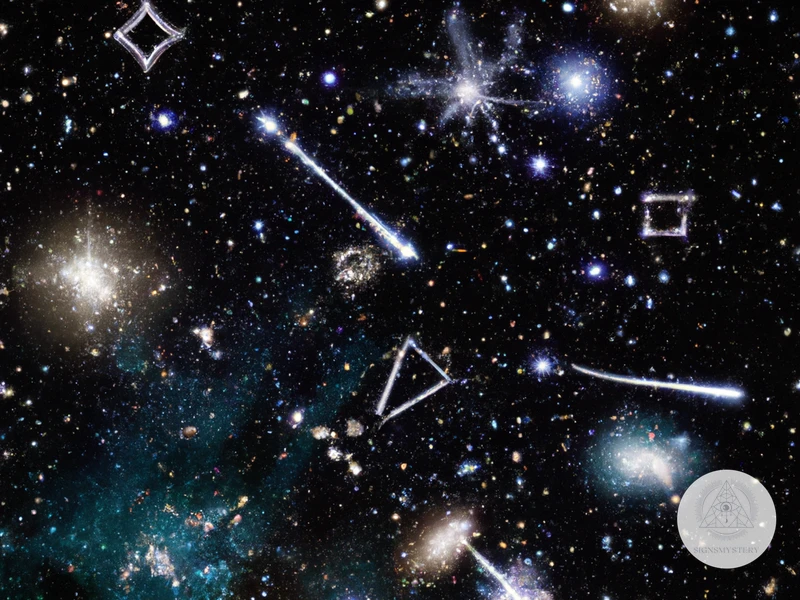
In conclusion, the role of mythology in astrology is a fascinating aspect that adds depth, meaning, and storytelling to the practice. The connection between mythology and astrology dates back to ancient civilizations, where mythological figures were used as a framework to interpret the movements and positions of celestial bodies. By associating zodiac signs with mythological characters, astrology provides a relatable and symbolic representation of human qualities and behaviors.
The incorporation of archetypes and symbolism from mythology allows astrology to offer profound insights and understanding into our own nature and purpose. Mythological stories provide a narrative backdrop for exploring the complexities of astrology and gaining a deeper understanding of ourselves and the world around us. It offers a means of connecting with the collective unconscious and tapping into the universal patterns of behavior and personality traits that shape our lives.
Furthermore, mythology plays a significant role in astrology’s interpretation and forecasting. Mythological aspects are incorporated into horoscope readings, offering a unique perspective on the events and challenges that individuals may encounter. Mythical stories provide a rich tapestry for horoscope interpretations, adding depth and intrigue to the forecasts.
The influence of mythology on horoscopes is undeniable. It adds a layer of storytelling and symbolism that captures the imagination and offers a profound way of understanding and navigating life’s journeys. By exploring the mythical connections within astrology, we can gain a greater appreciation for its wisdom and insights.
In conclusion, the relationship between mythology and astrology is a harmonious one, intertwining the ancient tales of gods and goddesses with the intricate patterns of the celestial world. It is through this connection that astrology becomes a powerful tool for self-reflection, personal growth, and understanding. By embracing the mythology within astrology, we can unlock a deeper connection with ourselves and the universe, offering guidance, insight, and a sense of meaning and purpose in our lives.
Frequently Asked Questions
1. What is the significance of mythology in astrology?
Mythology in astrology provides a rich framework for understanding the archetypes, symbolism, and characteristics associated with each zodiac sign. It adds depth and narrative to the astrological interpretations and enables individuals to relate their own experiences to the ancient tales.
2. How do ancient mythological figures influence astrology?
Ancient mythological figures play a pivotal role in astrology by representing and embodying the traits and qualities associated with each zodiac sign. By drawing upon these figures, astrology assigns specific characteristics and behaviors to individuals born under each sign.
3. Can mythology help in interpreting astrology birth charts?
Yes, mythology can be a valuable tool in interpreting astrology birth charts. By understanding the mythological stories and archetypes associated with each planet, house, and aspect in the chart, we can gain deeper insights into a person’s unique personality, strengths, and challenges.
4. How does mythology enhance horoscope interpretations?
Mythology enhances horoscope interpretations by infusing them with captivating mythological stories. These stories add depth and meaning to the astrological readings, providing individuals with a more comprehensive understanding of themselves and their life path.
5. Can astrology predict the future based on mythology?
Astrology, combined with mythology, serves as a tool for self-reflection and personal growth rather than a means to predict the future. It provides insights into one’s personality and the archetypal energies at play, offering guidance and understanding rather than definite predictions.
6. How do the Greek and Roman mythologies influence astrology?
Greek and Roman mythologies are highly influential in astrology. Many zodiac signs and planets are named after Greek and Roman gods and goddesses. These mythological figures embody specific qualities and serve as archetypal representations of the zodiac signs, enhancing our understanding of their characteristics.
7. Are there any mythological influences from Norse mythology in astrology?
Yes, Norse mythology has made its mark in astrology as well. The Norse gods and goddesses, such as Odin, Thor, and Freya, bring their own unique qualities and symbolism to the astrological interpretations, adding another layer of depth and connection to the divine.
8. How does Egyptian mythology contribute to astrology?
Egyptian mythology has a significant influence on astrology, especially through the symbolism of the Egyptian zodiac signs. Each sign represents a different deity or concept, offering distinct perspectives on personality traits and life lessons, deeply rooted in the rich mythology of ancient Egypt.
9. Can we find mythological aspects in horoscope forecasting?
Absolutely. Mythological aspects often find their way into horoscope forecasting, allowing for a more holistic interpretation of cosmic influences. By aligning mythological stories with astrological transits, we can gain insights into the archetypal energies at play during specific times.
10. How can mythological astrology readings benefit individuals seeking guidance?
Mythological astrology readings can benefit individuals seeking guidance by providing a comprehensive understanding of their strengths, challenges, and life purpose. By understanding the mythological archetypes that resonate within them, individuals can gain clarity, self-acceptance, and direction for their personal and spiritual growth.
References
- Exploring the Fascinating Similarities Between Greek …
- What is the connection between Greek mythology and …
- The Greek Origin of Zodiac Signs in Astrology
Frequently Asked Questions
1. How did astrology originate in ancient times?
Astrology has its origins in ancient civilizations such as Mesopotamia, Egypt, and Greece. These cultures believed that the movements of celestial bodies held significant meaning and could influence human behavior and events.
2. How are mythological figures associated with zodiac signs?
Mythological figures are often associated with zodiac signs based on their unique characteristics and symbolism. These figures provide a rich storytelling framework that helps interpret the traits and attributes of each zodiac sign.
3. What role do archetypes play in astrology?
Archetypes serve as universal, symbolic patterns that are deeply embedded in human consciousness. In astrology, archetypes help us understand the different energies and personality traits associated with each zodiac sign.
4. Which mythological influences are popular in Greek mythology?
Greek mythology has a significant influence on astrology, with mythological figures like Zeus, Aphrodite, and Apollo being associated with various zodiac signs. These figures embody qualities that align with the characteristics of those signs.
5. Are there any Roman mythological figures linked to astrology?
Yes, Roman mythology also plays a role in astrology. Figures like Venus, Mars, and Jupiter have connections to specific zodiac signs and bring their unique qualities and symbolism into astrological interpretations.
6. How does Norse mythology influence astrology?
Norse mythology has its impact on astrology, with figures such as Odin, Thor, and Freya influencing specific zodiac signs. The qualities and stories of these Norse gods and goddesses contribute to the interpretation of astrology.
7. Do Egyptian mythological figures have a role in astrology?
Absolutely. Egyptian mythology has left its mark in astrology, with figures like Ra, Horus, and Isis being associated with different zodiac signs. These mythological influences add depth to the interpretation of astrology.
8. How can zodiac sign characteristics be understood through mythology?
By examining the stories and characteristics of mythological figures connected to each zodiac sign, we can gain deeper insights into the traits and qualities associated with those signs. Mythology provides a storytelling context for understanding zodiac signs.
9. How are astrological birth charts related to mythological connections?
Astrological birth charts, also known as natal charts, provide a roadmap of an individual’s personality traits and life events. Mythological connections can be made by examining the planetary positions in the birth chart and relating them to the symbolism of mythological figures.
10. What is a mythological astrology reading?
A mythological astrology reading involves analyzing an individual’s birth chart with a focus on the mythological influences associated with the zodiac signs and planetary placements. It helps bring a mythological narrative to the interpretation of astrology.
References
- Astrology :: Character Traits & Personalities of Zodiac Signs
- Goddess Vibes: The Mythology of the 12 Zodiac Signs

